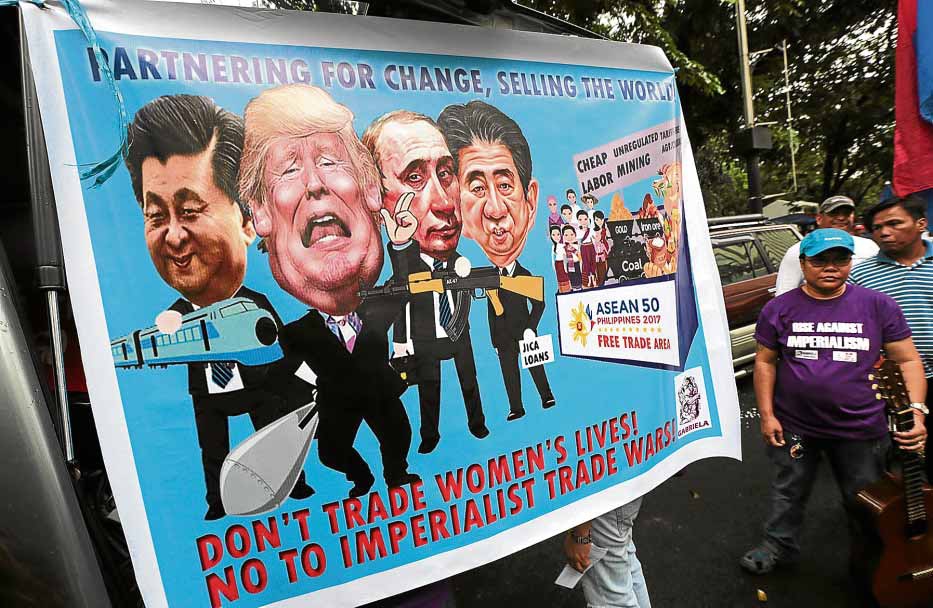Asean, Apec leaders urged to tackle human rights crises

NO TO TRUMP AGENDA Women activists march on the US Embassy in Manila to protest US President Donald Trump’s trade and security agenda when he visits Manila to meet with heads of states of the Association of Southeast Asian Nations next week.—GRIG C. MONTEGRANDE
Human Rights Watch on Thursday urged world leaders converging for annual summits in Southeast Asia to tackle the region’s human rights crises led by the plight of Rohingya Muslims in Myanmar and what it called the “murderous” antidrug crackdown in the Philippines.
The call made by the US-based group, however, could run against obstacles as the hosts of the summits of the Association of Southeast Asian Nations (Asean) in the Philippines and the Asia-Pacific Economic Cooperation (Apec) in Vietnam are among leaders in the crosshairs of human rights watchdogs.
The 10-nation Asean, where Myanmar, the Philippines and Vietnam are members, has a bedrock policy of noninterference in each of its members’ domestic affairs, something that has been used in the past by erring governments like Myanmar’s junta to parry criticisms by fellow member states.
Any leader, along with Western counterparts attending expanded summits, however, could raise controversial issues during closed-door informal sessions they call “retreats,” or in one-on-one meetings on the sidelines.
Rights catastrophes
Aside from rights groups, Western leaders like US President Donald Trump are under pressure from other officials in their countries to press human rights concerns.
Brad Adams, Asia director of Human Rights Watch, said the crisis facing Rohingya Muslims, more than 600,000 of whom have been forced to flee from Myanmar to Bangladesh, “is among the worst human rights catastrophes in Asia in years and demands concerted global action.”
“World leaders shouldn’t return home from these summits without agreeing to targeted sanctions to pressure Burma to end its abuses and allow in independent observers and aid groups,” Adams said.
Myanmar is formerly known as Burma.
The “massacres, rape, looting and mass burnings of homes and property” that have caused vast numbers of Rohingya to flee “amount to crimes against humanity,” Human Rights Watch said, adding tougher measures were needed to press Myanmar to end abuses, acknowledge rampant rights violations and ensure the safety of displaced Muslims.
Myanmar’s leader and foreign minister Aung San Suu Kyi will attend the Asean and Apec summits.
Her country is not a formal Apec member but she’s attending upon the invitation of Vietnamese President Tran Dai Quang, according to Myanmar’s state-run TV.
The Nobel Peace Prize laureate has faced growing international condemnation over violence against the Rohingya.
In Vietnam, Apec leaders, who are gathering there on Friday, should raise concerns about the host country’s “escalating crackdown on dissidents and human rights defenders,” the group said, citing the jailing of more than 100 political prisoners.
When leaders travel to Manila starting Sunday for the Asean summits, “surely someone from among the 20 world leaders at these summits can confront (Philippine President Rodrigo) Duterte about his horrific and unprecedented ‘drug war’ killings,” Adams said.
“Widespread summary executions of drug suspects are not just illegal, they are ineffectual and cruel,” he added.
‘Lay off’
Mr. Duterte denies he has a policy condoning extrajudicial killings but has openly threatened drug suspects with death.
He bristles over criticism of his deadly anticrime methods and has warned he would deal sternly with any leader who would raise human rights issues to his face.
“You want to ask a question, I’ll give you an answer. Lay off. That is not your business. That is my business. I take care of my country and I will nurture my country to health,” Mr. Duterte said would be his reply if Trump or others raised the issue.
Trump will be in Manila on the last leg of his 12-day Asian trip, which included visits to Japan, South Korea, China and Vietnam.
He will attend the Apec Summit in Da Nang, Vietnam, make a state visit to Hanoi and end his trip with the Asean and East Asia summits in the Philippines.
US lawmakers’ request
Republican Rep. Randy Hultgren of Illinois and Democratic Rep. James McGovern of Massachusetts, who cochair the Tom Lantos Human Rights Commission, have written to Trump to ask him to “impress upon President Duterte the United States’ profound concern” over the thousands of drug-related killings in the Philippines.
Mr. Duterte’s spokesperson, Harry Roque, on Thursday said Malacañang had no comment on the two US lawmakers’ request to Trump.
“President Duterte and President Trump have warm rapport, and can have candid and productive discussions on matters of shared interest,” Roque said in a statement.
The Philippines, he said, continues to adhere to the rule of law and is committed to the protection of human rights.—REPORTS FROM AP AND LEILA B. SALAVERRIA